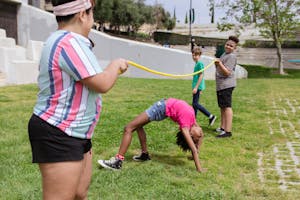The Importance of Nurturing Social Networks in a Busy World
I admire children’s ability to form friendships effortlessly. The ease with which they bond over building sandcastles or sharing snacks is truly enviable. Reflecting on our teenage years and twenties, it seemed natural to building strong social networks, as it was an engaging way to meet new people and provided an escape from our parents’ homes.
As we grow older, our lives change significantly. We may find a partner, start a family, and dedicate time to our careers. During this time, it’s common for our social circles to dwindle. It’s essential to acknowledge that priorities shift, and maintaining the friendships we have becomes increasingly important. With part-time jobs, entrepreneurial pursuits, and various activities occupying our time, finding moments to socialize can be challenging.
This blog post will explore the significance of nurturing social connections throughout life’s transitions and offer tips on maintaining friendships, even in the busiest of times.

Exploring the Importance of Building Strong Social Networks Through a Case Study
Recently, I listened to a podcast discussing social isolation and how our digital devices and remote work contribute to a decreased sense of community. The speaker argued that people in the 60s, 70s, and 80s were happier and more social due to their involvement in community activities. For instance, parents would participate in PTA meetings, and joining bowling leagues was a popular pastime that allowed individuals to connect and socialize outside of work (1).
Considering this perspective, I want to delve deeper into the topic of social isolation through a case study. By examining the consequences of decreased social connections and learning from previous generations’ emphasis on community engagement, we can better understand the importance of nurturing our social networks in today’s fast-paced world.
Case Study: Liana’s Journey to Reconnect with Friends and Overcome Loneliness
Liana, a happily married mother of two, is a driven personal chef with her own home business. Due to her demanding work hours and family commitments, she found herself focusing solely on her job and family, causing her social life to suffer. Despite her busy schedule, Liana experienced feelings of loneliness and a lack of support outside her business and family.
Liana attributed her loneliness to the pandemic, during which she was out of work, caring for her children at home, and trying to launch her business. Realizing the importance of reconnecting with her longtime friends, whom she considered sisters, Liana decided to rekindle her friendships.
She began with manageable steps. First, she initiated a weekly check-in, setting aside 5-15 minutes for a phone call with one friend each week. This allowed them to catch up and stay connected despite their busy schedules. Second, Liana hosted a monthly weekend brunch at her home. The friends would gather for a 30-minute walk, followed by a meal where they sampled Liana’s new dishes for her clientele. Liana’s approach to rebuilding her friendships included two key strategies:
- Scheduling time in her calendar for check-ins, ensuring that her friendships became a priority amidst her busy life.
- Combining her passion for cooking with quality time spent with friends, making their gatherings more meaningful and engaging.
By implementing these simple yet effective strategies, Liana successfully reconnected with her friends and eased her feelings of loneliness. Her story serves as a reminder of the importance of nurturing friendships and the positive impact of social connections on our overall well-being.
The Impact of Building Strong Social Networks on Mental Health and Longevity
Liana’s story reflects many expert recommendations for fostering a healthier and happier psychological state. Research has shown that one-third of individuals aged 45 and older experience bouts of loneliness, with even higher rates among those aged 65 and above (2). Furthermore, studies have indicated that terminal decline in seniors can set in 3 to 5 years before death, with social isolation playing a significant role in impacting mental health and longevity (3).
A noteworthy example of fostering social connections can be found in Okinawan culture, as highlighted in the Blue Zones documentary. The concept of “Moai” is a social group that supports its members socially, financially, healthily, and spiritually. These groups meet with a common purpose, socialize regularly, and provide mutual support during challenging times (4). This practice reminds me of the close-knit friendships portrayed in the popular television series, The Golden Girls.
Learning from the experiences of Moai in Okinawan culture and Liana’s story, it’s evident that fostering social connections and nurturing our relationships are essential for better mental health and overall well-being. As you take steps to prioritize your social connections, let the bond between the Golden Girls serve as a reminder of the power of friendship. Seek out your own Blanche Devereaux – a friend who embodies loyalty, strength, and warmth – and embrace the laughter and love that come with maintaining or creating bonds.

Five Strategies to Improve Your Social Network and Overall Well-being
If you’re experiencing loneliness, regardless of your age, consider these expert-recommended strategies to help you form new connections and improve your social network (5):
- Get active with others: Joining a gym, running group, or yoga or fitness class provides dual benefits. You will improve your physical health and make new friends with similar interests.
- Take a class or join a group: Learning a new skill or concept is beneficial for both brain health (6) and building your social network. By engaging in shared interests, it becomes easier to break the ice with others and establish connections.
- Schedule dates: Set aside time in your calendar to connect with family and friends, either in person or virtually. Making this a habit will help you stay present and invested in the relationships you value most.
- Volunteering: Volunteering not only allows you to give back to your community but also promotes stronger relationships and a sense of personal fulfillment. Acts of kindness are contagious and can contribute to greater overall happiness.
- Visit your local community center: Participating in events at your local community center will enable you to network with people who live nearby, potentially leading to new friendships based on shared passions or interests.
Implementing these strategies can help you combat loneliness and strengthen your social network, leading to enhanced mental well-being and overall life satisfaction.
Finding Friendships Through Common Interests: A Reminder for All Ages
If you’re feeling alone and unwell, don’t let opportunities for connection pass you by. Reach out to community groups that provide regular interaction with like-minded individuals. Whether you’re an artist looking to learn a new medium or a salsa dance enthusiast eager to practice your moves, engaging in activities you love can serve as a foundation for building new friendships.
Volunteering at local organizations, such as assisting with a food drive at your local food bank, can also provide opportunities to connect with others while giving back to your community. You can even invite friends to join you, fostering deeper relationships through shared experiences and acts of kindness.
Remember, building relationships with others can bring joy, promote happiness, and provide valuable learning experiences as you grow and develop. If you’re feeling hesitant to reach out, consider joining a group centered around a passion or interest you hold. Forming friendships becomes easier when you share common ground. After all, if children can form friendships over something as simple as playing in a sandbox, we too can connect with new friends over a shared love for a novel or a hot yoga class.



